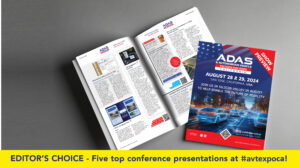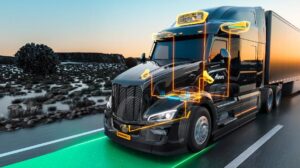Industry News
EDITOR’S PICKS: Highlights from this year’s #AVTExpoCA conference
With the start of ADAS & Autonomous Vehicle Technology Expo California at the McEnery Convention Center, San Jose, now just weeks away (August 28 & 29, 2024), AAVI shares some of the presentations it is most looking forward to at this year’s conference (rates apply). It’s not too late to reserve your place, with a 5% discount available to readers of AAVI! (Just enter the discount code ‘AAVi5’ when you register!)
Transitioning from research to production-level autonomous vehicle testing
Torc has a rich, diverse history in the autonomous vehicle space dating back to 2005.
Waymo’s AD tech to be highlighted in exhibit at Petersen Automotive Museum
The Petersen Automotive Museum, an automobile museum located in Los Angeles, California, is putting on four new exhibits this August. Among these, a key highlight is ‘Driven by Possibility: Waymo’s Road to Autonomous Transport,’ which focuses on Waymo’s advancements in autonomous driving (AD) technology.
The Waymo exhibit, located in the Production Gallery, will trace the journey from its origins as the Google self-driving car project to its current status as a leader in autonomous ride hailing. Visitors will get a behind-the-scenes look at Waymo’s development process through unique displays, including Waymo’s Firefly prototype, the first autonomous vehicle to pilot a passenger without an accompanying driver.
Applied Intuition raises over US$300m funding in secondary round
Silicon Valley-based vehicle software supplier Applied Intuition has closed a secondary round of over US$300m and welcomed Fidelity Management & Research Company as a new investor. Existing investors General Catalyst, Bond, Lux Capital and Elad Gil also participated. As part of the secondary sale, investors purchased equity from current employees, former employees and early investors.
“It’s fantastic to have the support of top-tier, long-term institutional investors,” said Qasar Younis, co-founder and CEO of Applied Intuition. “This secondary round is a testament to our growth, and it marks our third tender offer with some of our biggest shareholders – our employees.
Sany’s electric mixer truck passes benchmark for EU General Safety Regulation
The 408P electric mixer truck, developed by the Chinese heavy equipment manufacturer Sany Group, has successfully passed the updated EU General Safety Regulation (GSR) benchmark. The company says the truck is the first Chinese electric engineering vehicle to receive the latest Whole Vehicle Type-Approval (SVTA) certificate.
The 408P’s certification was conducted under the supervision of TÜV Rheinland, a technical service provider. The tests confirmed that the Sany 408P electric mixer truck is safe, reliable and compliant with EU regulations and standards. The vehicle’s advanced driver-assistance system (ADAS), developed by Haistar, was highlighted by TÜV for its adaptability and expandability.
exida certifies Vector’s basic software for autonomous driving
exida, an independent and internationally recognized specialist for functional safety, has once again certified Vector’s MICROSAR Classic Safe basic software up to the highest level: ASIL D. In addition to the regular recertification, the focus was also on proving that the MICROSAR Classic Safe basic software meets the safety requirements for availability in redundant systems. This means that ECU developers at automotive manufacturers and their suppliers can now use the basic software for autonomous driving functions.
The assessors from exida evaluated modules from various domains of the basic software. They determined their freedom from interference regarding memory and the correct implementation of the dedicated safety requirements that ensure the availability of redundant systems.
Continental and Aurora confirm scale production of Aurora Driver in 2027
At this September’s IAA Transportation 2024 in Hannover, Germany, Continental and Aurora Innovation will detail more about their co-developed scalable Level 4 autonomous trucking system, which they plan to start scale production of in 2027. The two partners finalized the design of the automotive-grade system back in January 2024.
In addition to recapping development work done to date, Continental will present the new industrial fallback system – a specialized secondary system that can take over operation if a failure occurs in the primary system (for example, if a key component or sensor breaks or fails).
TRI and Stanford Engineering achieve world’s first autonomous tandem drift sequence
The Toyota Research Institute (TRI) and Stanford Engineering have achieved the world’s first autonomously drifting sequence featuring two cars in tandem following almost seven years of collaborative research to make driving safer.
Though drifting has become a popular competitive sport, much of the physics involved in controlling a vehicle during such a maneuver has obvious relevance to mitigating such conditions in road vehicles. The experiments automate a motorsport drifting maneuver, where a driver precisely controls a vehicle’s direction after breaking traction, by spinning the rear tires. By adding a second car drifting in tandem, the teams were able to simulate more closely dynamic conditions where cars must respond quickly to other vehicles, pedestrians and cyclists.
emotion3D’s AI solution takes over interior safety checks for Moia’s ID. Buzz AD shuttle fleet
Moia is using AI-enabled interior analysis software to carry out certain safety checks on board its fleet of Volkswagen-supplied self-driving, all-electric ID. Buzz AD vehicles. Developed by emotion3D, the software uses artificial intelligence to take over safety tasks previously managed by the driver. It automatically detects if the doors are clear, if an object is blocking the cabin floor and the lighting conditions inside the vehicle.
Additionally, it checks the permitted number of passengers and their correct use of seatbelts. Within a few seconds, the AI-supported software signals the self-driving vehicle to drive or, if necessary, hands over to the fleet control center.









